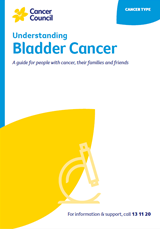- Home
- Bladder cancer
- Diagnosis
- Your health care team
Your health care team
Your general practitioner (GP) will arrange the first tests to assess your symptoms. If these tests do not rule out cancer, you will usually be referred to a specialist called a urologist. The specialist will arrange further tests.
If bladder cancer is diagnosed, the urologist will consider treatment options. Often the urologist will discuss your treatment options with other health professionals at what is known as a multidisciplinary team (MDT) meeting.
During and after treatment, you will see a range of health professionals who specialise in different aspects of your care. To find cancer specialists, multidisciplinary teams and hospitals in NSW or ACT, you can visit the NSW Government website CanRefer.
Health professionals you may see
| urologist/urological surgeon | treats diseases of the male and female urinary systems and the male reproductive system; performs surgery |
| medical oncologist | treats cancer with drug therapies such as chemotherapy and immunotherapy |
| radiation oncologist | treats cancer by prescribing and overseeing a course of radiation therapy |
| cancer care coordinator, urology nurse specialist | coordinate your care, liaise with other members of the MDT and support you and your family throughout treatment; care may also be coordinated by a clinical nurse consultant (CNC) |
| nurse | administers drugs and provides care, information and support throughout treatment |
| continence nurse | assesses bladder and bowel control, and helps you find ways to manage any changes |
| stomal therapy nurse | provides information about surgery and can help you adjust to life with a stoma |
| dietitian | helps with nutrition concerns and recommends changes to diet during treatment and recovery |
| social worker | links you to support services and helps you with emotional, practical and financial issues |
| physiotherapist | helps with restoring movement and mobility; a continence physiotherapist provides exercises to help strengthen pelvic floor muscles and improve bladder and bowel control |
| exercise physiologist | prescribes exercise to help improve your overall health, fitness, strength and energy levels |
| psychologist, counsellor | help you manage your emotional response to diagnosis and treatment |
→ READ MORE: Making treatment decisions for bladder cancer
Podcast: Coping with a Cancer Diagnosis
Listen now
More resources
Prof Dickon Hayne, Professor of Urology, UWA Medical School, The University of Western Australia, Chair of the Bladder, Urothelial and Penile Cancer Subcommittee, ANZUP Cancer Trials Group, and Head of Urology, South Metropolitan Health Service, WA; A/Prof Tom Shakespeare, Director, Radiation Oncology, Coffs Harbour, Port Macquarie and Lismore Public Hospitals, NSW; Helen Anderson, Genitourinary Cancer Nurse Navigator (CNS), Gold Coast University Hospital, QLD; BEAT Bladder Cancer Australia; Mark Jenkin, Consumer; Dr Ganessan Kichenadasse, Lead, SA Cancer Clinical Network, Commission of Excellence and Innovation in Health, and Medical Oncologist, Flinders Centre for Innovation in Cancer, SA; A/Prof James Lynam, Medical Oncology Staff Specialist, Calvary Mater Newcastle, NSW; Jack McDonald, Consumer; Caitriona Nienaber, 13 11 20 Consultant, Cancer Council WA; Tara Redemski, Senior Physiotherapist – Cancer and Blood Disorders, Gold Coast University Hospital, QLD; Prof Shomik Sengupta, Consultant Urologist, Eastern Health and Professor of Surgery, Eastern Health Clinical School, Monash University, VIC.
View the Cancer Council NSW editorial policy.
View all publications or call 13 11 20 for free printed copies.



